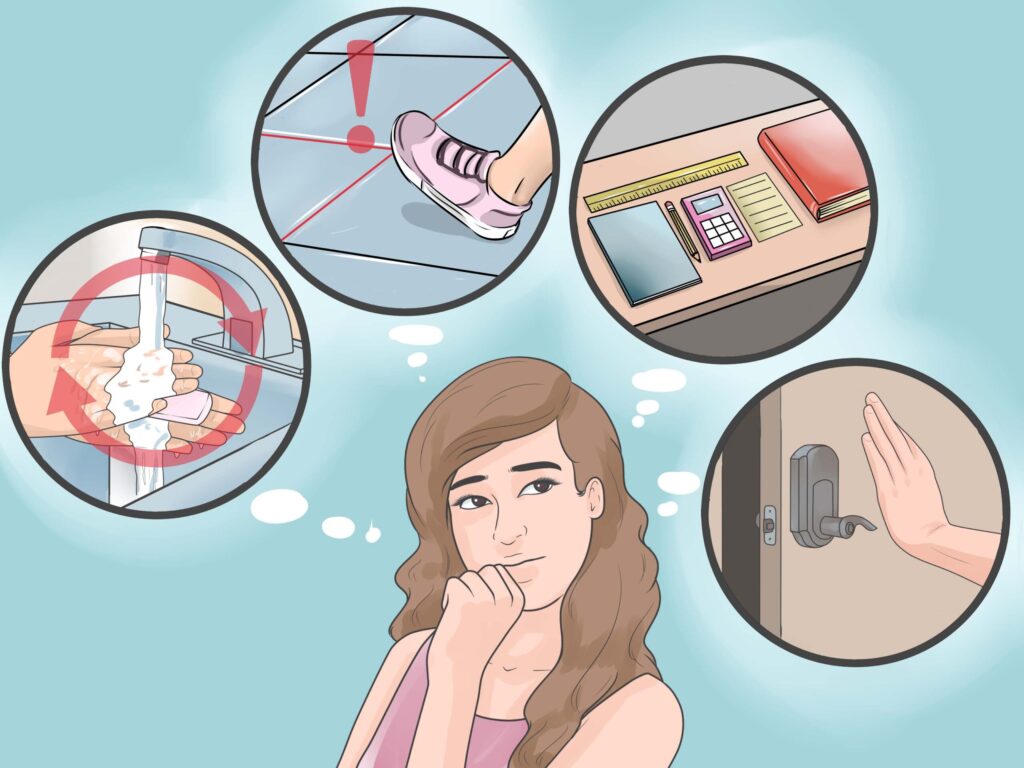Obsessive-Compulsive Disorder, also known as OCD, is a long-lasting mental health condition. It involves unwanted thoughts (obsessions) and repetitive actions (compulsions). People with OCD feel stuck in a cycle: they experience distressing thoughts and then perform certain behaviors to relieve the anxiety caused by those thoughts.
According to the World Health Organization (WHO), OCD affects about 2–3% of the world’s population, making it one of the most common anxiety-related disorders. Sadly, many people do not seek help early, which makes symptoms stronger over time.
Awareness is key. By understanding OCD, its symptoms, and treatment options, people can find relief and support.
What is Obsessive-Compulsive Disorder?
OCD is a mental health disorder where unwanted thoughts trigger repetitive behaviors. For example, someone might fear germs (obsession) and wash their hands repeatedly (compulsion). These actions may reduce anxiety for a short time, but usually return stronger.
Obsessive-Compulsive Disorder is not simply about being neat or a perfectionist. It is a serious condition that can interfere with daily life, relationships, school, or work.
Many myths about OCD often create confusion. One common belief is that OCD is just about being neat, tidy, or overly organized. In reality, Obsessive-Compulsive Disorder is a serious mental health disorder that involves unwanted, intrusive thoughts and compulsive behaviors performed to reduce anxiety. These actions are not simply habits but distressing cycles that interfere with daily life.
Another misconception is that people with OCD can “just stop” their behaviors if they try harder. The truth is that OCD is not a matter of willpower; it is linked to brain function and requires proper treatment. Many also think Obsessive-Compulsive Disorder is rare, but it actually affects millions worldwide.
According to the International OCD Foundation, OCD affects people of all ages, genders, and backgrounds, proving it is far more common and complex than stereotypes suggest.
Raising awareness about these misconceptions helps reduce stigma, encourages empathy, and motivates people to seek treatment without shame.
Obsessive-Compulsive Disorder Symptoms

When it comes to obsessive-compulsiev disorder symptoms, it has two parts. They are obsessions and compulsions, which include:
Obsessions (thoughts):
- Fear of germs or contamination
- Worry about harming oneself or others
- Unwanted aggressive or sexual thoughts
- Fear of making mistakes or forgetting things
Compulsions (behaviors):
- Excessive hand washing or cleaning
- Checking locks, switches, or appliances repeatedly
- Counting or arranging objects in a particular order
- Repeating words or actions until “it feels right”
OCD symptoms may come and go or change over time. They can be mild for some, but severe for others.
Causes of Obsessive-Compulsive Disorder
Experts believe OCD results from a mix of factors, not one single cause.
- Biological: Imbalance in brain chemicals like serotonin.
- Genetic: Family history increases the chance of OCD.
- Environmental: Stressful events or trauma may trigger symptoms.
- Personality: People who are highly anxious or perfectionists may be more vulnerable.
Impact of Obsessive-Compulsive Disorder
OCD affects much more than just daily habits.
On Mental Health: Constant anxiety, guilt, or frustration.
On Physical Health: Repetitive actions like over-washing can cause pain or skin problems.
On Relationships: Family or friends may not understand the behavior, leading to conflicts.
On Productivity: Time spent on compulsions reduces focus on studies, work, or personal goals.
Without treatment, OCD can take control of life. But with help, recovery is possible.
ALSO READ
Stress Symptoms, Causes, & Management Strategies 2025 Guide
Obsessive-Compulsive Disorder Treatment Options
The good news is that OCD is treatable. Many people improve with therapy, medication, or lifestyle changes.
Therapy
Cognitive Behavioral Therapy (CBT), especially a type called Exposure and Response Prevention (ERP), is the most effective treatment for OCD. It helps people face their fears without doing compulsive actions.
Medications
Doctors may prescribe antidepressants, especially SSRIs, to balance brain chemicals and reduce symptoms.
Lifestyle Changes
Exercise, proper sleep, and mindfulness practices like meditation can ease stress and improve well-being.
Support Systems
Support from family, friends, or OCD groups makes a big difference. Sharing experiences helps people feel less alone.
Medical Procedures
In severe cases, advanced treatments like deep-brain stimulation (DBS) may be suggested.
FAQs
What is OCD?
OCD is a mental health disorder with unwanted thoughts (obsessions) and repetitive actions (compulsions). It can affect daily routines and quality of life if untreated.
What are common symptoms of OCD?
OCD symptoms include excessive cleaning, checking, counting, or arranging, often driven by fear or unwanted thoughts. These behaviors bring short relief but do not solve the problem.
What causes OCD?
OCD results from a mix of brain chemistry, family history, stress, and personality factors. No single cause explains all cases.
How does OCD impact health?
OCD increases anxiety, harms relationships, and reduces productivity. Physical issues like skin damage from over-washing are also common.
Can OCD be cured?
There is no permanent cure, but effective treatments exist. Therapy, medicines, and lifestyle changes help people manage OCD successfully.
What is the best treatment for OCD?
The most effective treatment is CBT with ERP, often combined with medication. With consistent support, many people live full and healthy lives.
Sum Up
Obsessive-Compulsive Disorder is more than habits or perfectionism. It is a serious mental health condition that affects millions worldwide. Recognizing the symptoms, seeking professional help, and building support systems can make life easier for those with OCD. With therapy, medication, and awareness, people can manage OCD and improve their well-being.
Sources: International OCD Foundation, World Health Organization



Join The Discussion